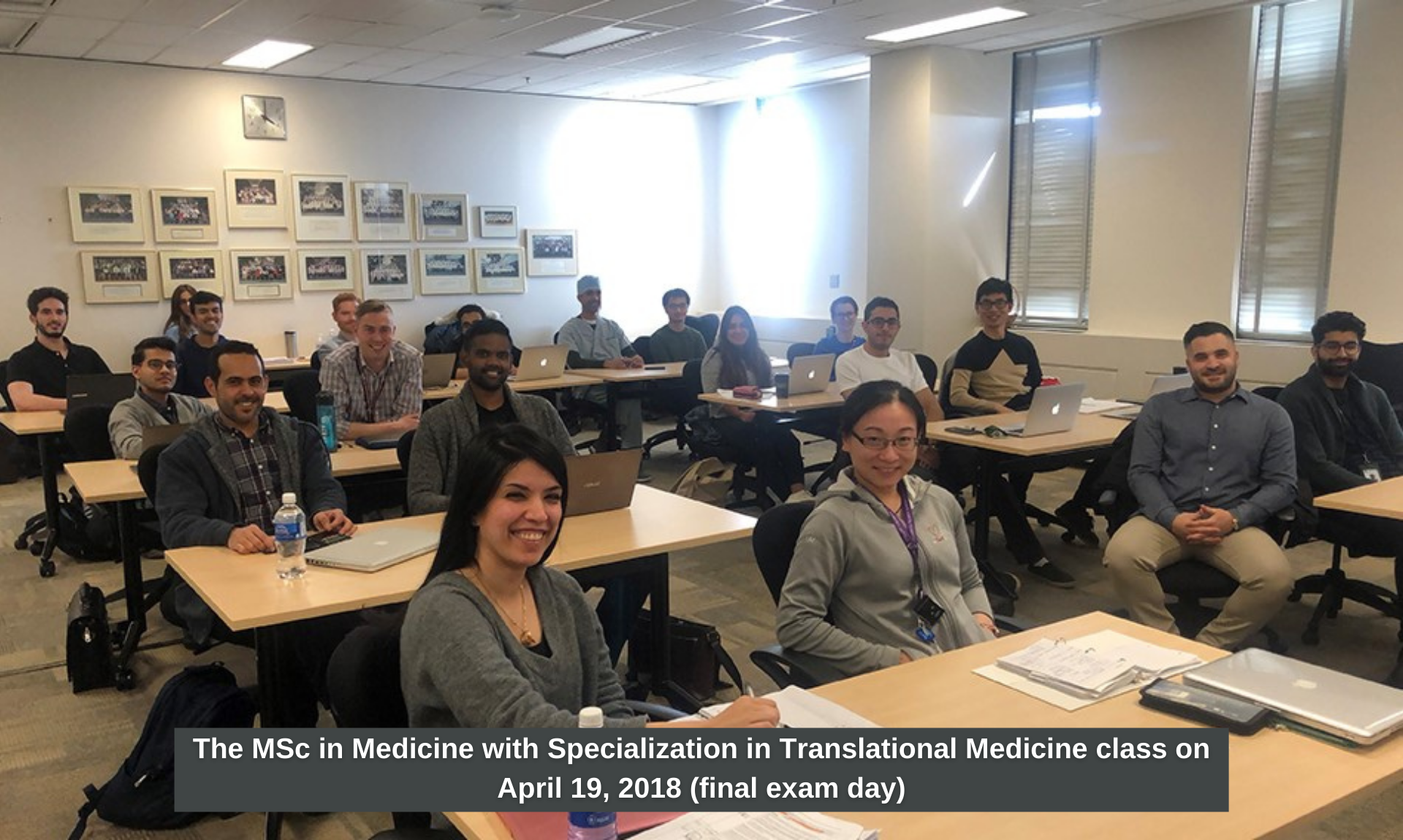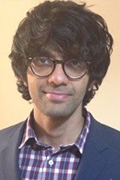MSc in Medicine with Specialization in Translational Medicine

Program Information
Steering Committee
The Department of Medicine (DOM) has made Translational Research (TR) a top priority. TR facilitates the "translation" of molecular discoveries to actual patients and populations. It requires a different way of thinking at all stages of the journey from a discovery in an animal lab to the point that, following successful clinical trials, the government approves the discovered therapy for humans. TR is a critical component of Precision Medicine, a new discipline that aims for "custom-made" therapies for patients, as opposed to the traditional "one treatment fits all model". This is because in order to apply an optimal therapy to a patient, one needs to understand the molecular and genetic differences that distinguish all patients from one another. Precision and Translational Medicine are now top priorities for both the DOM and the FOMD.
The need:
- To optimize the development of new "precision" therapies and diagnostic tests, a researcher studying molecules and animals needs to learn how to think as a clinician; and a clinical researcher needs to understand the principles of molecular research. This is challenging because traditional teaching models focus on one or the other, with the learners following either an exclusive molecular or clinical research career track. Although all recognize the importance of TR, there are surprisingly few examples of training programs worldwide aiming to teach this new discipline to future medical researchers and leaders.
- The number of Physician Scientists, i.e. MDs that spend a large part of their time doing research, has been constantly declining. PS are ideally positioned to conduct TR but they have to excel in both clinical medicine and research and commit to research training in addition to the very length clinical training.
The action:
Four years ago, the DOM launched and since then supports a novel training program, teaching the attitudes and skills required to excel in TR, while facilitating the entrance to a PS career track. This is the first training program of its kind in Canada and one of few in the world.
The innovations:
The TM program attracts trainees from diverse backgrounds and levels of training, including trainees with a PhD background and MDs (residents or clinical fellows) wishing to pursue research and a PS career path. Rather than teaching principles of basic or clinical research of specific diseases, the program teaches integrative and overarching concepts and skills to address the many challenges of bringing a molecular discovery to patients with diverse diseases. Since nothing needs to be "memorized", the final exams are "open book". Teaching objectives include, among others, new ways to design animal experiments or clinical trials compatible with TR, strategies to attract funding including grant writing skills, effective ways to communicate cross-disciplinary research findings, understanding of regulatory rules and "quality control" principles in both preclinical and clinical research. Most of these principles are not taught in traditionally structured curricula. The trainees can either get credits towards their PhD or towards a novel Masters Program with "specialization in Translational Medicine", the first of its kind in Canada.
The program uses eClass, the University of Alberta's centrally learning management system. eClass provides a digital platform in which the reading materials are archived as well as an out-of-class forum for ongoing discussions among trainees. All sessions are recorded through the eClass multimedia environment with Adobe Connect. This allows "live" streaming of sessions to other locations; thus the lectures can be attended interactively online by residents in a remote elective rotation or by trainees from other Universities, or by trainees offline (i.e. a "flipped classroom" environment). For example, in the last year 2 residents from the University of British Columbia completed the program. The ability of residents to obtain a Masters degree during busy core Internal Medicine or specialty residency/fellowship is a significant advantage to our clinical training programs. This integration of research training during clinical training programs (i.e. residency) is an important innovation designed to facilitate entrance to a PS career track. For example, the sessions take place during the internal medicine residency academic half day, where the clinical trainees are protected form clinical duties.
The progress:
A total of 72 learners have registered to the program so far. Of these, some took credits for their PhD and some participated as "open access" students. Of the 50 trainees that participated in the Masters track, there were 2 junior faculty members, 14 graduate students and 26 residents from core and 10 specialty residency programs. To complete the Masters requirements a submission of a thesis is required. So far 20 trainees have obtained their "Master's with specialization in Translational Medicine".
The TR training program is a major investment of the DOM, with many of its faculty contributing over the years. Currently, the program is directed by its founder, Evangelos Michelakis MD, as well as Gopinath Sutendra, PhD, Glen Jickling, MD, PhD and Eleni Karageorgos.
Testimonials from the MSc in Medicine with Specialization in Translational Medicine graduates
 |
Tayne Hewer; Graduate Student (2017): "…When I attended the first class I was incredibly nervous, felt overwhelmed and out of place. As the program progressed, I became more confident and truly engaged in the messages brought forward with each session. In the past I took education for granted but the TM program changed this for me. While I am not sure where my career in clinical research will take me, I can honestly say that this program has changed the way I approach learning and my job…" |
 |
Abhinav Sharma, MD; Cardiology Resident (2016): "The Master's program in translational science gave me the tools and skills necessary to bridge the gap between basic science and clinical research. I feel more confident in examining clinical questions through a basic science lens while examining bench and laboratory work from a clinical perspective. If you are looking for a program that will allow you to interface between the bench and bedside, then this program is for you." |
 |
Adam Kinnaird, MD, PhD; Vanier Scholar; Urology Resident (2015): "I would recommend this program to any graduate student or clinician who is interested in a career in translational research. The concepts that we discussed are not found in traditional basic science undergraduate, medical or post-graduate medical programs in our country. Our institution is truly on the leading edge offering this program and as such, knowledge obtained in this Master's program will give all who attend an advantage in the field of translational medicine." |